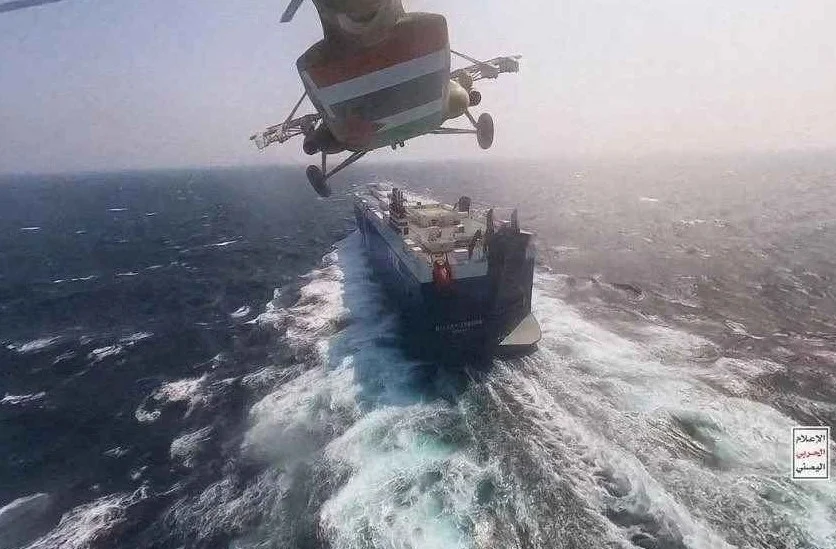
In Summary:
- Iran-backed Houthis’ assaults on commercial vessels in the Red Sea.
- China, a key trading partner, pressures Iran to halt attacks to safeguard trade interests.
Jan 26 (TopNews) – In exclusive discussions between Chinese and Iranian officials, China has explicitly conveyed its concerns regarding the Houthis’ attacks on ships in the Red Sea.
“Basically, China says: ‘If our interests are harmed in any way, it will impact our business with Tehran. So tell the Houthis to show restraint’,” emphasized an Iranian official familiar with the talks, speaking to Reuters on condition of anonymity.
TopNews.co.ke observed China’s commitment to promoting regional stability, with Chinese officials stating, “We firmly support Middle Eastern countries in strengthening their strategic independence and uniting and collaborating to resolve regional security issues.”
Keep Reading:
- WATCH: Ugandan Minister Okello Oryem Labels Hunger-Afflicted Ugandans ‘Idiots’ – Video Included
- Trump’s New Hampshire Win Reveals Cracks in Support Among Moderates
- Dutch Court Issues 12-Year Sentence to Syria Pro-Government Fighter for War Crimes
Despite China’s leverage over Iran due to its substantial oil purchases, it has been hesitant to exert pressure on Tehran. Analysts noted that China seems to prefer leveraging the U.S.-led efforts to safeguard navigation in the Red Sea while maintaining distance from direct involvement.
Ali Vaez, an analyst, explained, “China prefers to free-ride on the U.S. safeguarding freedom of navigation in the Red Sea by bloodying the Houthis’ nose,” highlighting Beijing’s cautious approach given Iran’s limited control over its Yemeni allies.
Iran’s Response:
Houthi spokesman Mohammed Abdulsalam dismissed any notion of Iran conveying China’s concerns, asserting, “They will not inform us of such a request, especially since Iran’s stated position is to support Yemen.”
Geopolitical Considerations:
The complexity of Tehran’s decision-making process is underscored by the significant influence of regional alliances and ideological considerations.
“Regional alliances and priorities as well as ideological considerations contribute significantly to Tehran’s decisions,” highlighted one insider, emphasizing Iran’s intricate balancing act amidst competing geopolitical interests.
Amidst escalating tensions in the Red Sea region, global stakeholders are closely monitoring the dynamics of the conflict. The maritime disruptions caused by Houthi attacks have not only impacted shipping routes but have also heightened geopolitical rivalries.
“The situation in the Red Sea is of paramount concern,” stated a diplomatic source familiar with the matter, emphasizing the urgency of addressing the escalating crisis.
Furthermore, the Red Sea crisis has reignited discussions about the role of regional alliances and the shifting balance of power in the Middle East. Iran’s support for various proxy groups, including the Houthis in Yemen, Hezbollah in Lebanon, and militias in Iraq and Syria, underscores its broader geopolitical strategy aimed at countering Western influence in the region.
In response to mounting pressure from international actors, Iran has reiterated its commitment to supporting the Palestinian cause and defending the rights of oppressed communities. Tehran’s rhetoric reflects its efforts to maintain solidarity with its allies while navigating the complexities of regional conflicts.
“Iran stands firm in its support for oppressed communities,” affirmed a spokesperson from Tehran, echoing the sentiments expressed by Iranian leadership.
International Response to Red Sea Crisis:
Following the recent US-UK airstrikes on Houthi targets in Yemen, over 19 nations, including Saudi Arabia, Iran, Turkey, NATO, and the United Nations, have expressed concerns about escalating tensions in the Red Sea region.
The airstrikes, aimed at deterring Houthi attacks on international shipping, have sparked debates about the legality and proportionality of military interventions in Yemen. Diplomatic efforts for de-escalation remain crucial amidst ongoing regional instability..
Meanwhile, China’s growing involvement in Middle Eastern affairs highlights its expanding geopolitical footprint. As the world’s largest trading nation, China’s interests in the region extend beyond economic considerations to strategic partnerships and regional stability.
Beijing’s diplomatic overtures to both Iran and Saudi Arabia underscore its efforts to maintain a delicate balance between competing interests.
The Red Sea crisis serves as a reminder of the interconnectedness of global affairs and the challenges of navigating complex geopolitical landscapes.
As stakeholders continue to seek diplomatic solutions to mitigate tensions, the implications of the conflict reverberate across the broader geopolitical spectrum, shaping the contours of international relations in the 21st century.
Understanding the Issues (FAQs):
1. What prompts China’s intervention in the Red Sea crisis?
- China’s burgeoning economic interests in the Middle East, particularly its reliance on Iranian oil imports, incentivize proactive measures to safeguard maritime trade routes from Houthi disruptions.
2. How does Iran respond to China’s demands amidst escalating tensions?
- Iran, while cognizant of China’s economic influence, navigates a delicate balance between upholding trade relations and preserving its regional alliances, considering the multifaceted implications of its decisions on geopolitical stability.
3. What are the broader geopolitical ramifications of the Red Sea crisis?
- The crisis underscores the intricate interplay between economic imperatives, regional alliances, and ideological affiliations, shaping the contours of diplomatic engagements and strategic maneuvers in the volatile Middle Eastern landscape.
